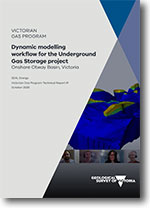VGP Technical Report 41 - Dynamic modelling workflow for the Underground Gas Storage project, Onshore Otway Basin, Victoria.
 |
| |||||||||||||||||||||||||||||||||||||||||||||||||||||||||||||||||||||||||||||||||||||||||||||||||||
Product description:About the Victorian Gas Program: The Victorian Gas Program (VGP) is a comprehensive science-led program, incorporating geoscientific and environmental research to assess the risks, benefits and impacts of potential onshore conventional gas exploration and production. The program is also investigating the potential for further discoveries of onshore conventional and offshore gas in the Otway and Gippsland geological basins and assessing the feasibility of additional onshore underground gas storage in depleted reservoirs around the Port Campbell area. The VGP includes an extensive, proactive and phased community and stakeholder engagement program, through which the results of the scientific studies are being communicated. Executive summary: The opportunity for further underground gas storage (UGS) in depleted gas fields in the onshore Otway Basin is being investigated as part of the Victorian Gas Program (VGP). There are currently three depleted gas fields used for UGS in Victoria. These sites are in the Port Campbell area in the onshore component of the Otway Basin. The primary purpose of UGS is to meet variations in supply and consumer demand, whereby gas is injected during a period of low demand and withdrawn during a period of peak demand. Storage capacity, injectivity and deliverability (withdrawal) are important characteristics of an underground gas storage site. Storage capacity is the volume of natural gas that can be stored in an underground storage facility. Injectivity is the amount of natural gas that can be injected, while deliverability is the amount of gas that can be withdrawn. The rates of injection and withdrawal change as the level of natural gas varies within the facility. The Geological Survey of Victoria (GSV) engaged SEAL Energy Pty Ltd (SEAL Energy) to carry out a suite of technical studies to investigate the potential for further underground gas storage at depleted gas fields in the onshore Otway Basin. Six sites (depleted gas fields) were selected through a ranking process (Bagheri, 2019) for static and dynamic modelling. The sites are Croft, Fenton Creek, McIntee, Mylor, Penryn and Tregony. Dynamic modelling is used to predict storage capacity, injectivity and deliverability. This is achieved by simulating the number of wells, tubing size and distribution rates of a potential UGS site to investigate the dynamic capacity of each site and to optimize potential development options. This report details the dynamic modelling workflow, which simulates the underground gas storage potential of the six modelled depleted gas fields and is supplementary to the overview provided in each modelling report. Publicly available data was compiled, analysed and reviewed for each of the six sites. This included detailed reservoir engineering analysis on fluid properties, relative permeability, capillary pressure analysis and gas water contacts. This allowed for an analytical Original Gas in Place (OGIP) volume to be calculated using material balance methods, which assisted the history matching processes. History matching involves adjusting the reservoir model until it closely reproduces historical production and pressure behaviours in the reservoir prior to dynamic modelling. The final history matched models were used to simulate gas storage scenarios to understand the potential for gas storage and potential development options for each site. The dynamic capacity of each site was investigated by changing the cycle volume for each scenario to understand the volume the depleted gas field can utilise as storage. The cycle volume is the total injection and production volume in each cycle. Development options were investigated by assessing how many wells would be required to achieve an optimal storage capacity and the sensitivity of the capacity to wellhead pressure and tubing size. The resulting storage capacity, along with the recommended development options for each field, are reported in each of the six dynamic modelling reports. Each dynamic model technical report is accompanied by the dynamic model and simulation results for each depleted gas field. Bibliographic reference: SEAL ENERGY, 2020. Dynamic modelling workflow for the Underground Gas Storage project, Onshore Otway Basin, Victoria. VGP Technical Report 41. Geological Survey of Victoria. Download: The downloadable version of this report is supplied in PDF format (PDF 4.1 MB). Related products:
| ||||||||||||||||||||||||||||||||||||||||||||||||||||||||||||||||||||||||||||||||||||||||||||||||||||








